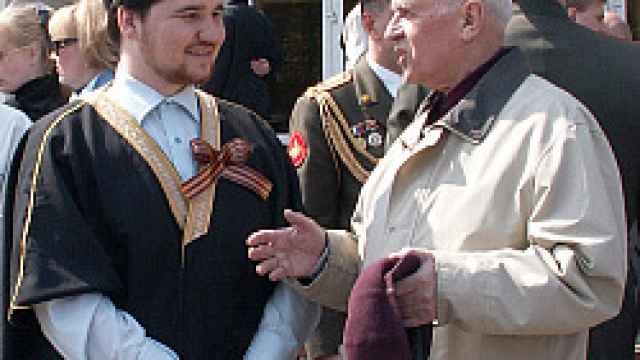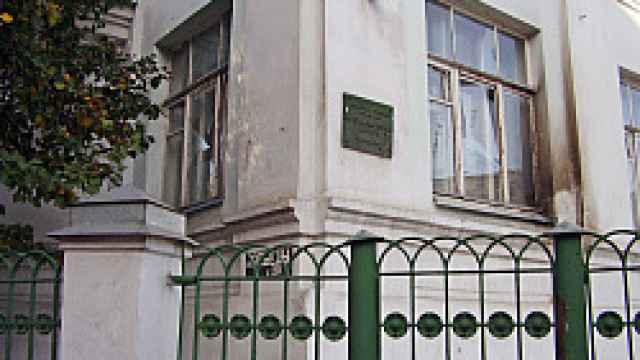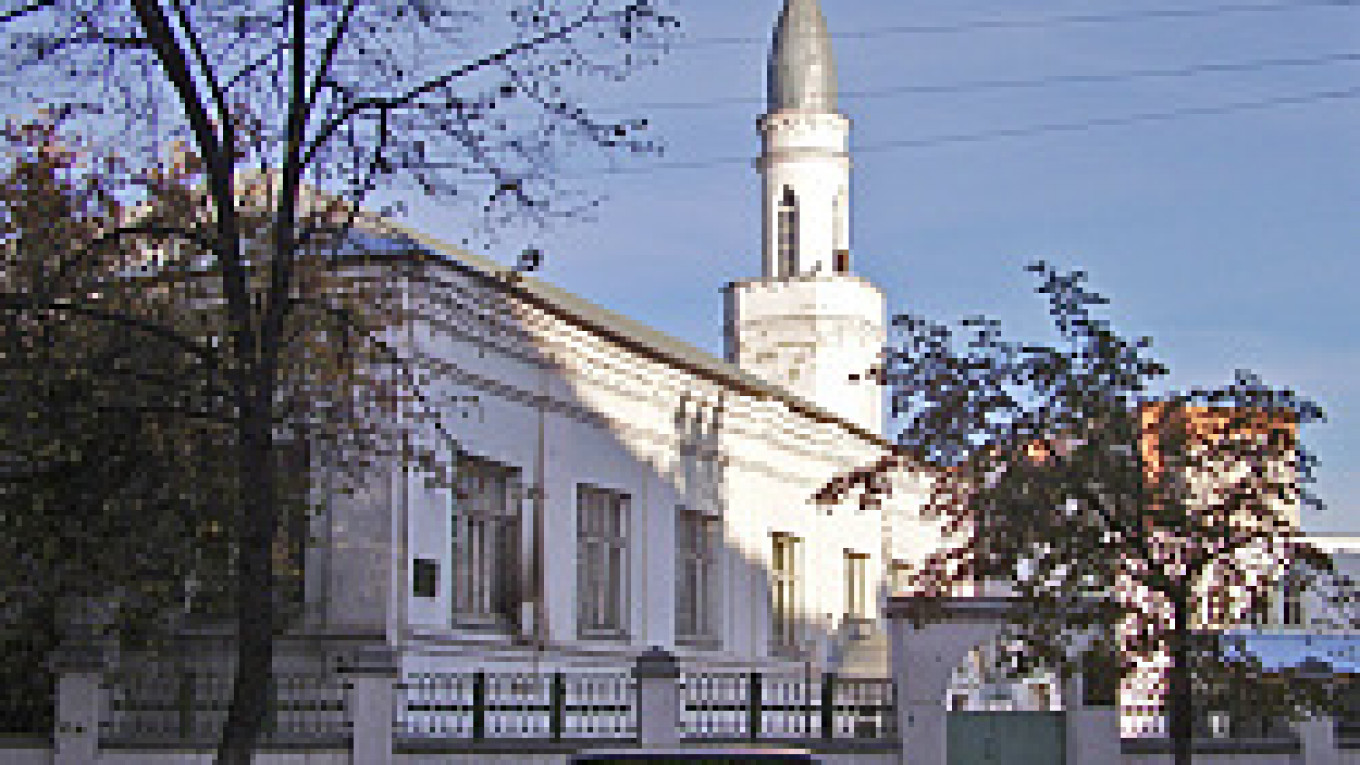And in their unity, they seemed unfazed by the ultranationalists who days earlier had firebombed this city's only mosque for the second time in a week.
Outside the mosque, the scars of the attacks were fading but visible: the spray-painted swastika, the white paint slopped over racist graffiti, the ugly rant scrawled on a rear gate -- "Death to blacks! Glory to Russia! Forward Slavs!"
But as the worshipers rose from their prayers, slipped on their shoes and headed out into the night, they voiced few fears about lurking thugs. There were no guards posted in the courtyard, no locks on the front gate.
"We're a part of this society," explained Rustam Batrov, 28, the Yaroslavl Mosque's imam. "This is our motherland. We've been here for 500 years. We aren't immigrants."
Still, said Tamur Sagayev, who came here from a Chechen village in 1997 to study political science, the same tensions that can be found almost everywhere between Muslims and non-Muslims exist in Yaroslavl.
Emir, also Chechen, moved to the city a year ago with his mother and grandmother.
Referring to the attacks, Emir, who declined to give his last name, sounded an ominous note, saying those arrested were not the real criminals. "Somebody asked them to do it, somebody who doesn't like us."
Batrov, for his part, called the attacks an aberration, adding that local officials had rallied behind the mosque. In the wake of the attacks, he said, Yaroslavl Governor Anatoly Lisitsyn had ordered the mayor to find the culprits. Two men have been arrested for the attacks. A federal agent was dispatched to help.
Regional officials are also paying for repairs, including the installation of video cameras and an alarm connected directly to the local police station, Batrov said. And last weekend, the pro-Kremlin youth group Nashi turned up outside the mosque to hold hands with Muslims and project an image of solidarity and tolerance.
"You have to understand," Batrov said. "Russia is a former empire. Muslims were a colony. In the historical memory of the people, the colonial tensions are alive. People remember that they deported the Crimean Tatars to Central Asia. You can't erase these things quickly. But we understand that we need a united future, whatever there was in the past."
 For MT The Yaroslavl Mosque's imam, Rustam Batrov, pictured with local officials. | |
Just a few weeks before the attacks, the regional government approved a $100,000 grant for the renovation of the mosque, which attracts mostly Sunnis from Azerbaijan, Tajikistan, Uzbekistan, Kyrgyzstan, Chechnya and Dagestan and includes a small number of Shiite Azeris.
Still, it's unclear how deeply felt all this unity is outside official circles. The local economy is relatively robust, papering over interethnic tensions. But there seems to be a growing recognition that elsewhere in Russia -- most recently, in Kondopoga, the site of race riots directed against natives of the Caucasus -- ancient fissures are giving rise to violent outbursts. The ongoing violence in Chechnya, politics and shifting economic and cultural forces complicate the often tenuous peace between Muslims and non-Muslims across the country.
On the surface, these tensions are not all that apparent in Yaroslavl. Nestled against the Volga River, the Golden Ring city of roughly 600,000 has a vibrant tourism industry, universities and institutes, a stately Kremlin and a wooden, red-and-yellow fire tower that watches over Red Square.
The country's main suppliers of diesel engines keep local factories bustling, and hundreds of state, private and joint-stock firms are registered here.
The Hotel Volga, with its 5,000-ruble-per-night ($187) rooms for riverboat tourists, has been renovated. The city's neoclassical facades hark back to the 18th-century grandeur of Catherine the Great. And the statue of Lenin in the city center, directing the masses toward utopia, looks almost charming squeezed between the trees with their leaves turning red, yellow, orange.
In 2010, Yaroslavl will celebrate its 1,000th anniversary, which also happens to be the 100th anniversary of the mosque. Local officials proudly note that Poitiers, France, is their sister city.
Still, less visible frictions persist.
 For MT Smashed windows and charred window frames attest to the firebombings. | |
Anna, 25, an Orthodox believer who recently graduated from an engineering institute and now sells fruit on Red Square, said television reinforced negative impressions of Muslims. She blamed the recent attacks on the mosque on "a few extreme elements" but added that people, in general, "relate poorly to Muslims now."
Buttressing the results of a recent survey of Yaroslavl residents -- which found that only 7 percent to 8 percent of respondents had Muslim friends -- Anna, who declined to give her last name, said she didn't have any problems with Muslims "in theory." "I vacationed in Turkey," she said, "and the people there were fine."
Many people in the city have no idea where the mosque, with its towering minaret, is located, even though it can be found a short walk from Red Square.
Russian conflicts with former Soviet republics also appear to have stoked some nationalistic fires.
Not far from Anna's fruit stand, on one of the city's main drags, a sign outside the Cafe Actor reads: "Hands Off Transdnestr; Georgia, you're wrong; Ukraine, think about it."
The Union of Councils for Soviet Jews has noted that in recent years, hundreds of skinheads from Yaroslavl have celebrated April 20, Adolf Hitler's birthday, by attacking Jews and other minorities.
Even Batrov, who was tapped by the country's grand mufti to serve here and said he had strong ties with local leaders, conceded that Yaroslavl was vulnerable to violence and hatred.
"It's a pan-Russian phenomenon," he said of tensions between ethnic Russians and Muslims. Referring to next year's parliamentary election, he said: "There may be a connection with the State Duma elections or what have you. We could see more attacks here. They've bombed us two times, but it won't work. They won't achieve any of their goals."
A Message from The Moscow Times:
Dear readers,
We are facing unprecedented challenges. Russia's Prosecutor General's Office has designated The Moscow Times as an "undesirable" organization, criminalizing our work and putting our staff at risk of prosecution. This follows our earlier unjust labeling as a "foreign agent."
These actions are direct attempts to silence independent journalism in Russia. The authorities claim our work "discredits the decisions of the Russian leadership." We see things differently: we strive to provide accurate, unbiased reporting on Russia.
We, the journalists of The Moscow Times, refuse to be silenced. But to continue our work, we need your help.
Your support, no matter how small, makes a world of difference. If you can, please support us monthly starting from just $2. It's quick to set up, and every contribution makes a significant impact.
By supporting The Moscow Times, you're defending open, independent journalism in the face of repression. Thank you for standing with us.
Remind me later.


